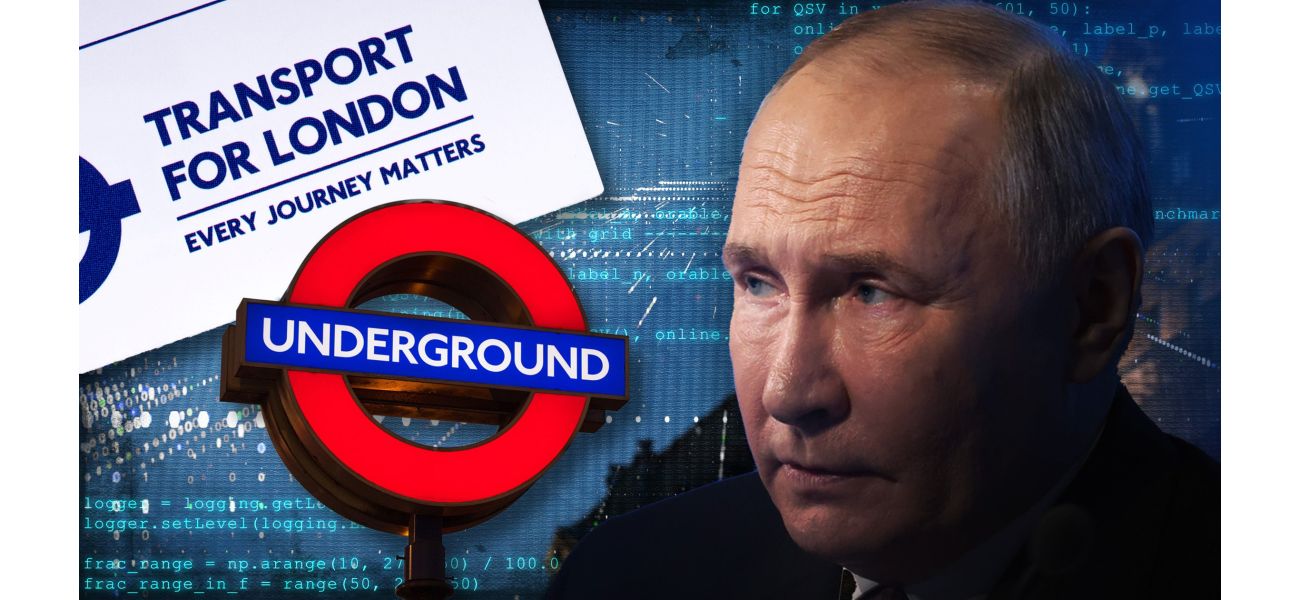Is Russia responsible for the recent TfL cyber attack as ransomware incidents increase?
Is it a hostile country or a criminal organization?
September 3rd 2024.

Russian President Vladimir Putin is notorious for using hackers to disrupt and destabilize his rivals' infrastructure. However, there are questions about whether Russia is behind the latest cyber attack on Transport for London (TfL). Some experts believe it could be the work of criminal groups looking to make money by holding networks for ransom.
Professor Alan Woodward, a cyber security expert at the University of Surrey who advises Europol, calls it "the $64,000 question." TfL, which operates London's trains, buses, and underground tube system, confirmed that they are dealing with a cyber security incident that has been ongoing since Tuesday. They assure the public that customer data and transport services are unaffected, but have not provided details about the target, source, or nature of the attack.
The possibility of a hostile actor like Russia being responsible is always a concern when it comes to cyber attacks. In the past, state-backed hackers from China accessed the data of 40 million voters in the UK. So it is not out of the question that this could be another case of a state-sponsored attack.
According to Professor Woodward, "it does look a bit that way when you look at the type of infrastructure and you think who would have a motive to attack it." While criminals could be motivated by financial gain, targeting something like TfL could also be a way to disrupt a nation and pose a national security threat. This raises the question of whether there is someone else behind the attack.
Transport infrastructure has become an increasingly popular target for cyber attacks, especially as tensions between Russia and Europe continue to rise. In May, the transport minister of Czechia accused Russia of using various forms of cyber attacks to target their signalling and ticket systems. Last August, hackers triggered an emergency stop on trains in Poland, causing chaos. Two men were arrested in connection with the incident, and a senior security official stated that the Russian Federation, in collaboration with Belarus, was attempting to destabilize the country.
The importance of infrastructure and the potential impact of cyber attacks were highlighted during Russia's invasion and war in Ukraine. Professor Woodward believes that cyber attacks were a crucial part of degrading the warfighting capabilities of both sides. He also suspects that these attacks could be unfriendly governments testing the waters to see what they can achieve.
Andrew Peck, a cyber resilience researcher at Loughborough University, believes that cyber attacks are now a given in our world. He points out that the hackers behind the TfL attack were smart to target the start of the school week, as it could have caused chaos if students were unable to use public transport. However, their timing missed the mark since TfL's systems are built to withstand cyber attacks, thanks to a combination of old and new technology. This provides them with resilience that many other systems, such as airline systems, lack.
It has been rumored for some time now that Russian President Vladimir Putin is known to utilize hackers as a means of causing chaos and instability among his rivals. The question on everyone's mind now is whether or not they are behind the recent cyber attack on Transport for London. Was this just a ploy by the Russian government to disrupt the city's infrastructure, or could it be the work of some opportunistic criminals looking to make a quick buck by holding the network for ransom?
According to Professor Alan Woodward, a renowned cyber security expert at the University of Surrey who advises the EU's law enforcement agency Europol, this is "the $64,000 question." The transport body of London, responsible for operating trains, buses, and the iconic underground tube system, confirmed yesterday that they were dealing with a cyber security incident that began on Tuesday. While they assured the public that customer data and transport services were not affected, they declined to provide further details on the target, source, or nature of the attack.
The possibility of a hostile actor like Russia being responsible for this attack is a concern that has been raised before in similar situations. In fact, there have been previous instances where state-backed hackers have successfully breached the digital networks of British institutions. For example, in March, it was revealed that a Chinese state-affiliated group known as APT31 had stolen the data of 40 million voters by accessing the Electoral Commission's email and file-sharing systems between 2021 and 2022. So, could this be another case of foreign interference?
With approximately 10 million journeys made on TfL services, such as the Tube, every day, the question arises as to who could have a motive for attacking such a vital infrastructure. Professor Woodward believes that it certainly raises suspicions and suggests that there could be a larger, more sinister force behind it. "Obviously, criminals could monetize it," he says, "but targeting something like this could also be a way to disrupt the nation and potentially pose a national security threat." So, it raises the question, is there someone else pulling the strings?
As tensions between Russia and the rest of Europe continue to rise, transport infrastructure has increasingly become a target for cyber attacks. In May, the transport minister of Czechia, Martin Kupka, claimed that Russia had used various forms of cyber attacks to target their signaling and ticket systems. Similarly, in Poland last August, dozens of trains came to a sudden halt when hackers triggered the emergency stop using radio transmissions. Two men were arrested in connection with the attack, and a senior security official stated that there had been attempts by Russia and their close ally, Belarus, to destabilize the Polish state.
The importance of infrastructure and the impact that hacking can have on it has been highlighted in recent years during Russia's invasion and war in Ukraine. Professor Woodward points out that cyber attacks played a significant role in degrading the warfighting capabilities of both sides. He also believes that these recent attacks could be a form of testing or prodding by unfriendly governments to see what they can achieve. "They may not necessarily be trying to cripple the London Underground or buses," he says, "but they are certainly probing to test their capabilities."
Andrew Peck, a cyber resilience researcher at Loughborough University, sees cyber attacks as a common occurrence in today's world. He notes that the timing of this attack, coinciding with the start of the school week, was spot-on, and had it been successful, it could have caused chaos. "Imagine if a child had gone to the bus stop or Tube station and found that there was no service," he says, "it would have been a disaster." However, the impact of the attack was minimal, indicating that the TfL system was likely well-protected. Peck explains that their system is a combination of old and new technology that may not always communicate seamlessly, but in a cyber attack, this can provide resilience, which many airlines lack, as seen in the CrowdStrike attack.
Professor Alan Woodward, a cyber security expert at the University of Surrey who advises Europol, calls it "the $64,000 question." TfL, which operates London's trains, buses, and underground tube system, confirmed that they are dealing with a cyber security incident that has been ongoing since Tuesday. They assure the public that customer data and transport services are unaffected, but have not provided details about the target, source, or nature of the attack.
The possibility of a hostile actor like Russia being responsible is always a concern when it comes to cyber attacks. In the past, state-backed hackers from China accessed the data of 40 million voters in the UK. So it is not out of the question that this could be another case of a state-sponsored attack.
According to Professor Woodward, "it does look a bit that way when you look at the type of infrastructure and you think who would have a motive to attack it." While criminals could be motivated by financial gain, targeting something like TfL could also be a way to disrupt a nation and pose a national security threat. This raises the question of whether there is someone else behind the attack.
Transport infrastructure has become an increasingly popular target for cyber attacks, especially as tensions between Russia and Europe continue to rise. In May, the transport minister of Czechia accused Russia of using various forms of cyber attacks to target their signalling and ticket systems. Last August, hackers triggered an emergency stop on trains in Poland, causing chaos. Two men were arrested in connection with the incident, and a senior security official stated that the Russian Federation, in collaboration with Belarus, was attempting to destabilize the country.
The importance of infrastructure and the potential impact of cyber attacks were highlighted during Russia's invasion and war in Ukraine. Professor Woodward believes that cyber attacks were a crucial part of degrading the warfighting capabilities of both sides. He also suspects that these attacks could be unfriendly governments testing the waters to see what they can achieve.
Andrew Peck, a cyber resilience researcher at Loughborough University, believes that cyber attacks are now a given in our world. He points out that the hackers behind the TfL attack were smart to target the start of the school week, as it could have caused chaos if students were unable to use public transport. However, their timing missed the mark since TfL's systems are built to withstand cyber attacks, thanks to a combination of old and new technology. This provides them with resilience that many other systems, such as airline systems, lack.
It has been rumored for some time now that Russian President Vladimir Putin is known to utilize hackers as a means of causing chaos and instability among his rivals. The question on everyone's mind now is whether or not they are behind the recent cyber attack on Transport for London. Was this just a ploy by the Russian government to disrupt the city's infrastructure, or could it be the work of some opportunistic criminals looking to make a quick buck by holding the network for ransom?
According to Professor Alan Woodward, a renowned cyber security expert at the University of Surrey who advises the EU's law enforcement agency Europol, this is "the $64,000 question." The transport body of London, responsible for operating trains, buses, and the iconic underground tube system, confirmed yesterday that they were dealing with a cyber security incident that began on Tuesday. While they assured the public that customer data and transport services were not affected, they declined to provide further details on the target, source, or nature of the attack.
The possibility of a hostile actor like Russia being responsible for this attack is a concern that has been raised before in similar situations. In fact, there have been previous instances where state-backed hackers have successfully breached the digital networks of British institutions. For example, in March, it was revealed that a Chinese state-affiliated group known as APT31 had stolen the data of 40 million voters by accessing the Electoral Commission's email and file-sharing systems between 2021 and 2022. So, could this be another case of foreign interference?
With approximately 10 million journeys made on TfL services, such as the Tube, every day, the question arises as to who could have a motive for attacking such a vital infrastructure. Professor Woodward believes that it certainly raises suspicions and suggests that there could be a larger, more sinister force behind it. "Obviously, criminals could monetize it," he says, "but targeting something like this could also be a way to disrupt the nation and potentially pose a national security threat." So, it raises the question, is there someone else pulling the strings?
As tensions between Russia and the rest of Europe continue to rise, transport infrastructure has increasingly become a target for cyber attacks. In May, the transport minister of Czechia, Martin Kupka, claimed that Russia had used various forms of cyber attacks to target their signaling and ticket systems. Similarly, in Poland last August, dozens of trains came to a sudden halt when hackers triggered the emergency stop using radio transmissions. Two men were arrested in connection with the attack, and a senior security official stated that there had been attempts by Russia and their close ally, Belarus, to destabilize the Polish state.
The importance of infrastructure and the impact that hacking can have on it has been highlighted in recent years during Russia's invasion and war in Ukraine. Professor Woodward points out that cyber attacks played a significant role in degrading the warfighting capabilities of both sides. He also believes that these recent attacks could be a form of testing or prodding by unfriendly governments to see what they can achieve. "They may not necessarily be trying to cripple the London Underground or buses," he says, "but they are certainly probing to test their capabilities."
Andrew Peck, a cyber resilience researcher at Loughborough University, sees cyber attacks as a common occurrence in today's world. He notes that the timing of this attack, coinciding with the start of the school week, was spot-on, and had it been successful, it could have caused chaos. "Imagine if a child had gone to the bus stop or Tube station and found that there was no service," he says, "it would have been a disaster." However, the impact of the attack was minimal, indicating that the TfL system was likely well-protected. Peck explains that their system is a combination of old and new technology that may not always communicate seamlessly, but in a cyber attack, this can provide resilience, which many airlines lack, as seen in the CrowdStrike attack.
[This article has been trending online recently and has been generated with AI. Your feed is customized.]
[Generative AI is experimental.]
0
0
Submit Comment





